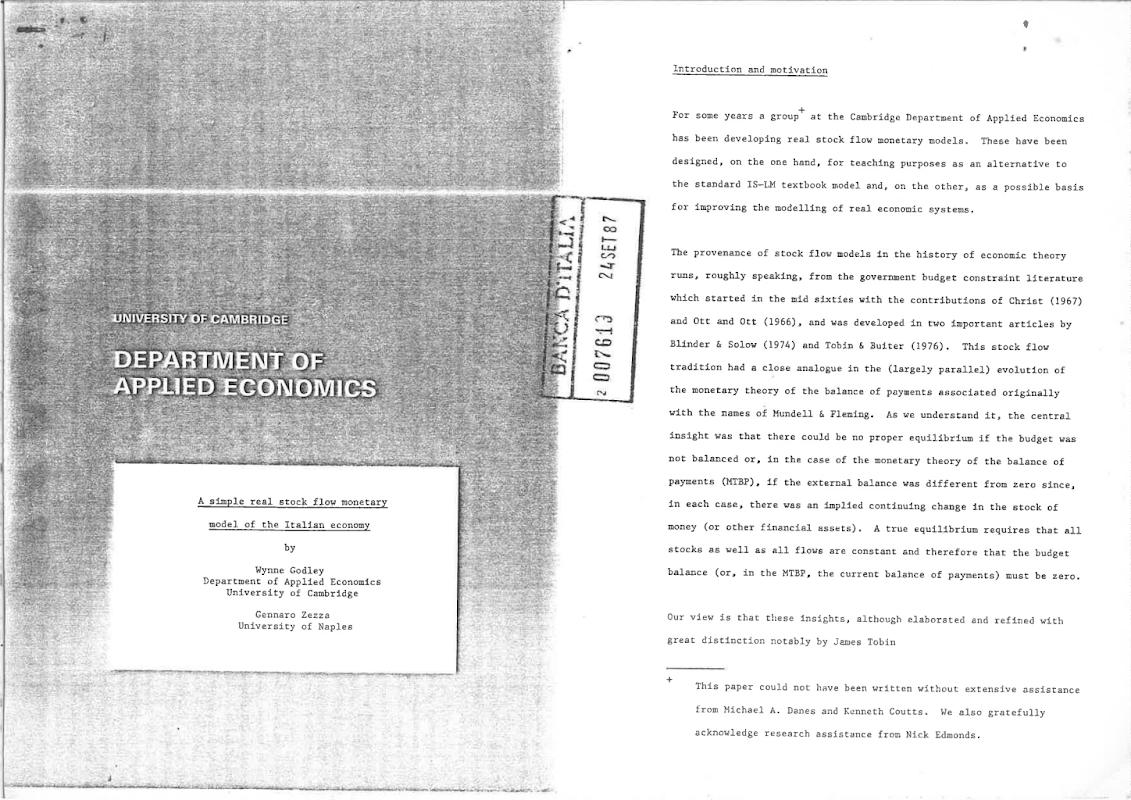Gennaro Zezza has shared a 1987 paper by him and Wynne Godley modeling the Italian economy using a “real stock flow monetary model”
Archives
Marc Lavoie — Advances In The Post-Keynesian Analysis Of Money And Finance
There’s a new article by Marc Lavoie in a newly released book which is an interesting read. Abstract:
This chapter focuses on the various monetary themes that have been emphasized by post-Keynesian economists and that turned out to have been validated by the events that occurred during and after the subprime financial crisis. These include interest rate targeting by the central bank, interest rate spreads, endogenous money, the reversed causality between reserves and money, the defensive role of central banks, the links between the central bank and the government, banks as very special financial institutions, the different role of the shadow banking system, and whether there are limits to the amounts of credit that banks can create. The chapter analyzes unconventional monetary policies, including quantitative easing (QE), QE for the people and 100% reserves. It also discusses the consequences, for the theory of endogenous central bank money, of the adoption of a system where the target interest rate is the interest rate on reserves.
Mario Seccareccia and Marc Lavoie — Central Banks, Secular Stagnation, And Loanable Funds
Mario Seccareccia and Marc Lavoie comment on Larry Summers’ recent shift on his view of fiscal policy:
… At the time [2013], however, he still sought to explain this new normalcy of secular stagnation in terms of interest rate rigidity.
Now, however, he seems to have abandoned that view altogether and has embraced Keynesian and post-Keynesian ideas originating with the General Theory. For instance, nowhere in the article by Summers and Stansbury is there mention of the negative natural rate as the explanation for an incapacity of central bankers to deal with secular stagnation. Is that because he has now abandoned the loanable funds theory, which remains at the core of mainstream thinking and to which he had previously subscribed? Nor do he and his coauthor suggest now that activist fiscal policy to combat secular stagnation is needed as a temporary measure to kick-start an economy stuck in a liquidity trap.
Gerald Epstein — What’s Wrong With Modern Money Theory
Gerald Epstein has written a book critiquing neochartalism from a policy perspective. On an initial look he seems to attack the neochartalists on two things: their reluctance to talk about rise in tax rates and the international aspect — the limited applicability of their ideas to a few rich countries.
Lawrence Summers On The Failure Of The New Consensus
Larry Summers has a Twitter thread in which he talks of how the economics profession got it wrong by downgrading fiscal policy. He also concedes to Post-Keynesians:
We have come to agree w/ the point long stressed by Post Keynesian economists & recently emphasized by Palley that the role of specific frictions in economic fluctuations should be de-emphasized relative to a more fundamental lack of aggregate demand.
The title is the link.
Matias Vernengo — Forty Years Of Balance Of Payments Constrained Growth And Thirlwall’s Law
According to Matias Vernengo, Review Of Keynesian Economics (ROKE) will soon publish a special issue on Thirlwall’s Law, with a contribution by Anthony Thirlwall himself.
Matias’ post has a scan of Thirlwall’s notes where he penned y = x/π.
Marc Lavoie has a new paper in Review Of Political Economy in which he explains how the Bank of Canada, the central bank of Canada 🇨🇦 is able to maintain the target interest rate at the center of the corridor with high perfection despite zero reserve requirement and clearing happening privately.
Abstract:
In a number of ways, implementing monetary policy in Canada stands apart from monetary policy in most other industrial countries. Commercial banks and other participants to the main clearinghouse – the large-value transfer system (LVTS) – hold no reserves at the central bank. Clearing and settlement is both in real time and net, while only settlement occurs on the books of the central bank. The Bank of Canada does not conduct open-market operations and rarely intervenes in the repo market; and despite this, the collateralized overnight rate always remains within 2 or 3 basis points of the target interest rate. The paper explains why this is so by describing the setup of the Canadian clearing and settlement system, including the rules that have been put forward in case a bank defaults on its due payments before settlement occurs. Some puzzles that arose through the years are also discussed, as well as the unlikely prospect of introducing blockchain technology in the Canadian clearing and settlement system.
Dani Rodrik — Globalization’s Wrong Turn And How It Hurt America
Some comments on globalisation by Bill Clinton and Tony Blair caught my attention in a recent article by Dani Rodrik for Foreign Affairs:
Globalization, exclaimed U.S. President Bill Clinton, “is the economic equivalent of a force of nature, like wind or water.” British Prime Minister Tony Blair mocked those who wanted to “debate globalization,” saying, “you might as well debate whether autumn should follow summer.”
Rodrik’s article takes issue with this, explaining how globalisation’s rules of the game aren’t immutable by going through its history.
As Noam Chomsky says, the term globalisation has been appropriated by a narrow sector of power and privilege to refer to their version of international integration and it makes sense for them to own the term because anyone who is opposed to their version becomes anti-globalisation—someone who is primitive and wants to go back to the stone age and that everyone likes international integration but not the investor rights version of it.
Although Rodrik proposes changes to the system/order, his proposals aren’t radical enough. He also presents it as if before neoliberalism became mainstream, it was great for poor countries but this isn’t the case. It was always unfair but became more unfair in the neoliberal era. Anyways, worth a read.
BadMouse On How The Left Abandoned Opposing The EU
BadMouse, the vlogger on the EU and Brexit:
The right has been a stickler when it comes to appropriating leftist talking points, as I have spoken numerous times now. The EU used to be lot more of a conservative tradition opposed by many factions of the left including, of course, the late Tony Benn. But after sections of the right-wing discourse took it by their shoulders, all the left could seem in response was to go, “No! EU good”.
The EU is an undemocratic monolithic entity that controls large hegemony over the continent. This is something the left has always been against and now we seem to have all been been shovelled into the pro-EU corner just to own the right is baffling. How dare they! How dare we allow them to take control of this narrative, on the topic of narratives.
Lance Taylor — Macroeconomic Stimulus À La MMT
Lance Taylor on troubles with Neochartalists; ideas of stimulus without raising tax rates and implications for the external imbalance.
Lance Taylor had an excellent review of the book Monetary Economics by Wynne Godley and Marc Lavoie, if you remember and you can find the reference in his post.


